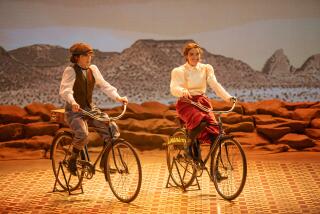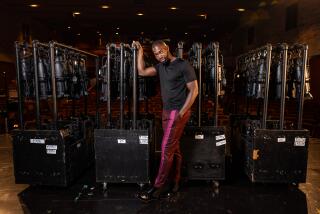A one-man show -- with a cast of dozens
IN two recent one-woman shows at Westwood’s Geffen Playhouse, Carrie Fisher and Joan Rivers seized the opportunity to turn the stage into a therapist’s couch, spilling both the secret and not-so-secret details of their lives, loves, addictions and cosmetic surgeries.
So would it not follow that Daniel Beaty, whose one-man show “Emergency” opens today at the Geffen, would head down the same cathartic path -- especially since the 32-year-old performer can top any of Rivers’ facial reinventions with a childhood saga that includes a father in jail, a brother hooked on crack cocaine and a mom too busy trying to support five children to have enough time to say “I love you”?
No way, says Beaty, who portrays more than 40 characters in “Emergency,” but never himself. “I wanted to write a play; I didn’t want to write a self-indulgent story of my life,” he says. “I’ve had plenty of drama in my life, which I talk about openly, but I use it to infuse my characters.”
FOR THE RECORD: This story states that Daniel Beaty’s one-man show “Emergency” opens at the Geffen Playhouse on Sunday, April 20. The show opens Wednesday, April 23. The story also refers to a recent Geffen presentation starring Joan Rivers as a “one-woman show.” There were several other performers in Rivers’ show.
Surrounded by a cross-section of humanity including a homeless man, a TV reporter, a female reality show host and a Southern grandmother, Beaty’s show tells the story of two African American brothers, one straight and one gay, whose lives are thrown into turmoil when a slave ship rises out of the Hudson River in front of the Statue of Liberty.
After several years of workshop performances, the show, under the title “Emergence-SEE!” and directed by Kenny Leon, premiered at New York’s Public Theater in 2006, winning the 2007 Obie Award for outstanding writing and performance.
New York Times critic Charles Isherwood offered that production a mixed review, calling Beaty’s central characters “compassionate and precise” but adding, “The notion of a phantom slave ship is provocative and funny, but many in the audience may still feel that on some level they’ve been there, done that and bought the T-shirt.”
For the Geffen, both the play’s title and director have changed. At the helm is Charles Randolph-Wright, who met Beaty, a 1998 Yale graduate, while the actor was completing his MFA degree at American Conservatory Theater in San Francisco.
Randolph-Wright -- who wrote “Blue” and “Cuttin’ Up,” presented at Pasadena Playhouse, and staged “The Tragic and Horrible Life of the Singing Nun” at Coast Playhouse -- says that, along with simplifying the play’s title, he and Beaty have worked on strengthening the story and human relationships within the play.
“One of my favorite pieces is Lily Tomlin’s ‘The Search for Signs of Intelligent Life in the Universe.’ What’s amazing about that play is it was play, even though she was playing all the characters,” Randolph-Wright says. Of Beaty’s play, he adds: “It’s uncompromising; some of it could be considered coming from an angry place, but it’s not a bitter place.”
Beaty also has written a six-character play called “Resurrection,” examining the state of black men in America, that he says is slated for performances at various regional theaters. As Beaty describes it, each man represents a different generation, all taken by surprise by a magical occurrence.
Puppy love
THE actor, singer, writer, composer, motivational speaker and award-winning slam poet who has performed at the Kennedy Center and the White House is not the sort to wallow in his painful past.
“Get out your little violin,” he cracks, before he’ll tell you the tear-jerker story of Daphne, the German shepherd puppy his mom once gave him in a little Easter basket, named after a character on “Scooby-Doo” because “I thought Daphne was beautiful. I remember consciously understanding what love was through that puppy,” he recalls.
“I spent the first years of my life being so unhappy that, if I never have another unhappy day, that’s fine with me,” Beaty says, clearly reveling in a sunny L.A. day that had begun with an audition for a sitcom pilot. “A lot of artists feel like they have to create out of drama and pain; I’m interested in creating as much joy as possible.”
For that reason, Beaty doesn’t read reviews: “I’m hypersensitive, and they hurt my feelings!” he says, with a loud laugh. Besides, even without critical input, Beaty is pretty clear on his own message: “We are all connected.”
“I thought it would be really fun to see one person become a little girl, a grandmother, a 400-year-old chief,a Republican, a liberal, gay and straight. . . . There is an energy that connects us all.”
That being said, though Beaty chooses to portray individuals of different ages, economic backgrounds and sexual orientation in “Emergency,” all of them are black.
“Black American culture, like every other culture, is extremely diverse,” he says. “I am very interested in giving voice to characters we have not seen before, and new voice to characters we think we have seen before.
“What is the magic, the possibility, in telling a story that is really authentically told through the lens of an African American experience?” Beaty continues. The goal, he says, is not to “put in some white characters so everyone will be comfortable, or do a stereotypical portrayal so it will be a black story told in such a way that nonblack people will have ‘easy access.’ ”
Beaty wants to challenge the preconceptions and prejudices of black audiences as well.
“I’ve had people of color say to me: ‘You did not just say that up there!’ And I’m like: ‘We have to say that; we have to have this conversation,” he says. “We are taking about issues of race, we are talking about issues of sexuality. Whether we bring them to the forefront or not, it’s in our conversation.”
One person impressed with the “conversation” is actress Ruby Dee, who, after seeing an early version of “Emergency,” produced a showcase performance for Beaty with her late actor-husband Ossie Davis. Dee also wrote to Larry Leon Hamlin, the late former producer of the National Black Theater Festival, who produced the show for the 2005 fest.
Dee, who has performed her own solo show “My Last Good Nerve,” says of Beaty, “He’s sensitive to the human condition; he’s sensitive to the interconnectedness of the events of the history of the country, and human development. He uses his sense of humor to tie things together. My sensibilities are aroused by this person who embodies so many people that we don’t usually have the gift to see or acknowledge.”
For his part, Beaty says: “I love Miss Dee. Whenever I felt sorry for myself and tried to call her to complain, she would not only remind me about what’s special about me, but about who I am in terms of history. The other thing that she reminds me of is importance of being who I am as an authentic artist, my quirkiness, and my humor.”
More to Read
The biggest entertainment stories
Get our big stories about Hollywood, film, television, music, arts, culture and more right in your inbox as soon as they publish.
You may occasionally receive promotional content from the Los Angeles Times.






